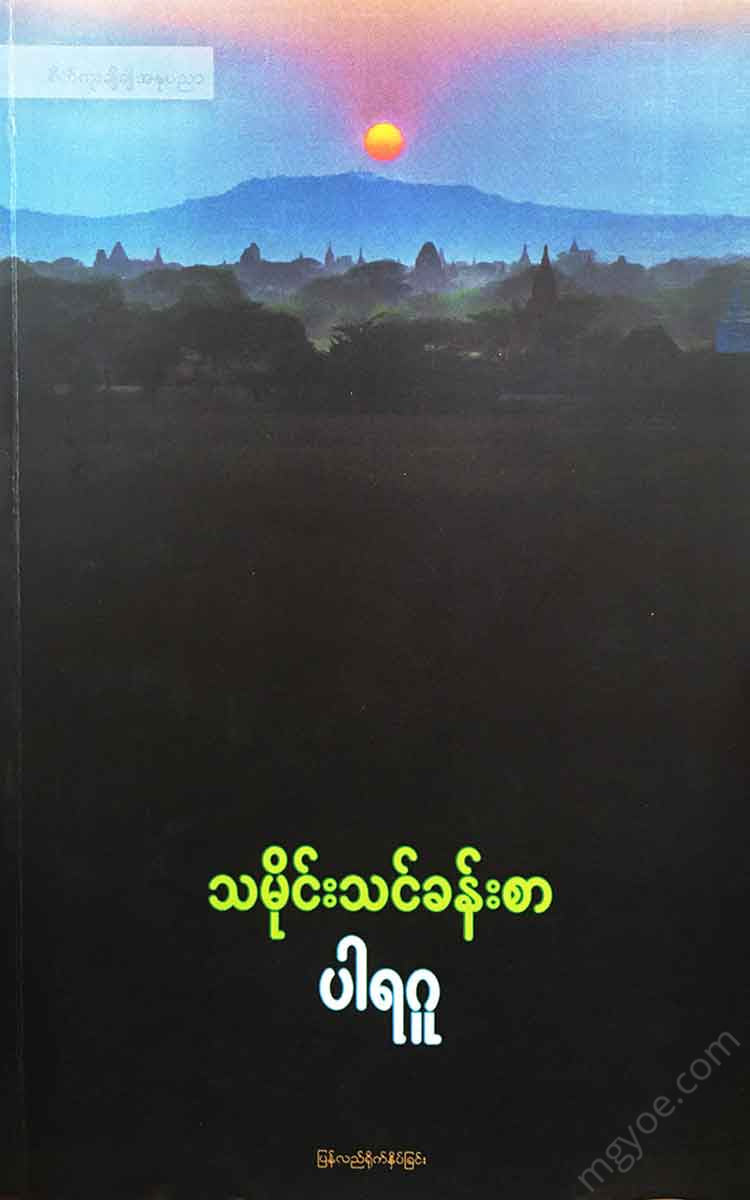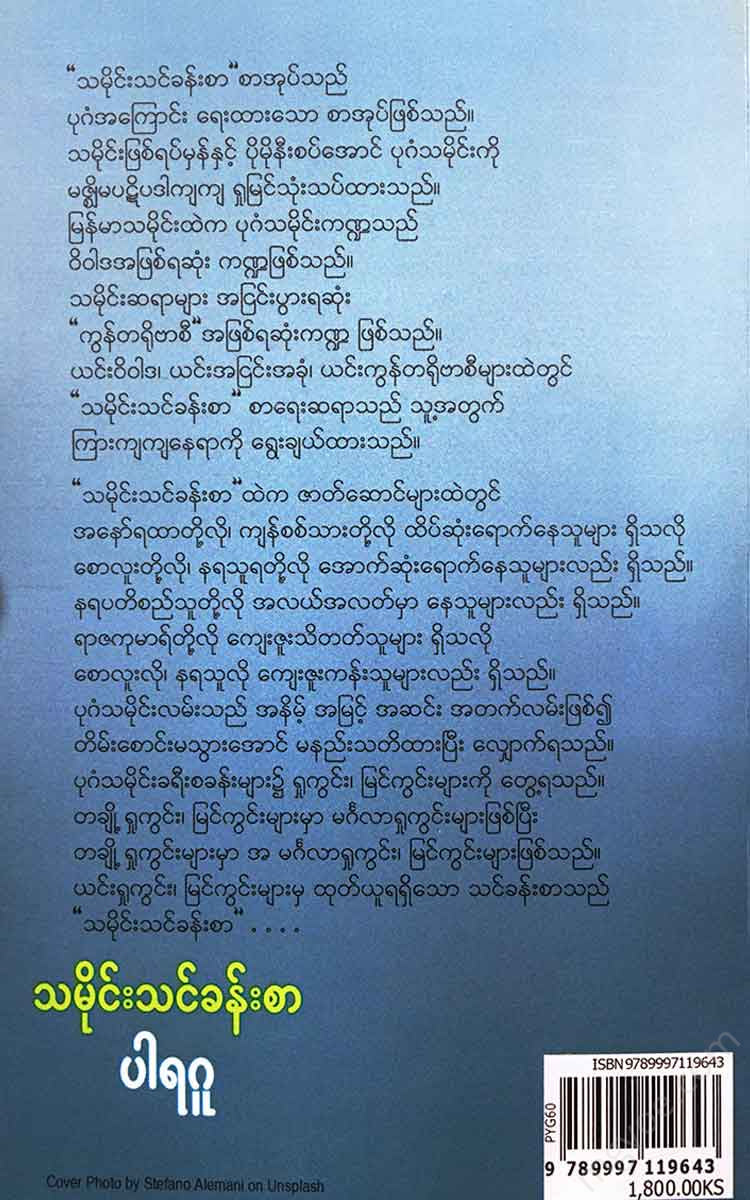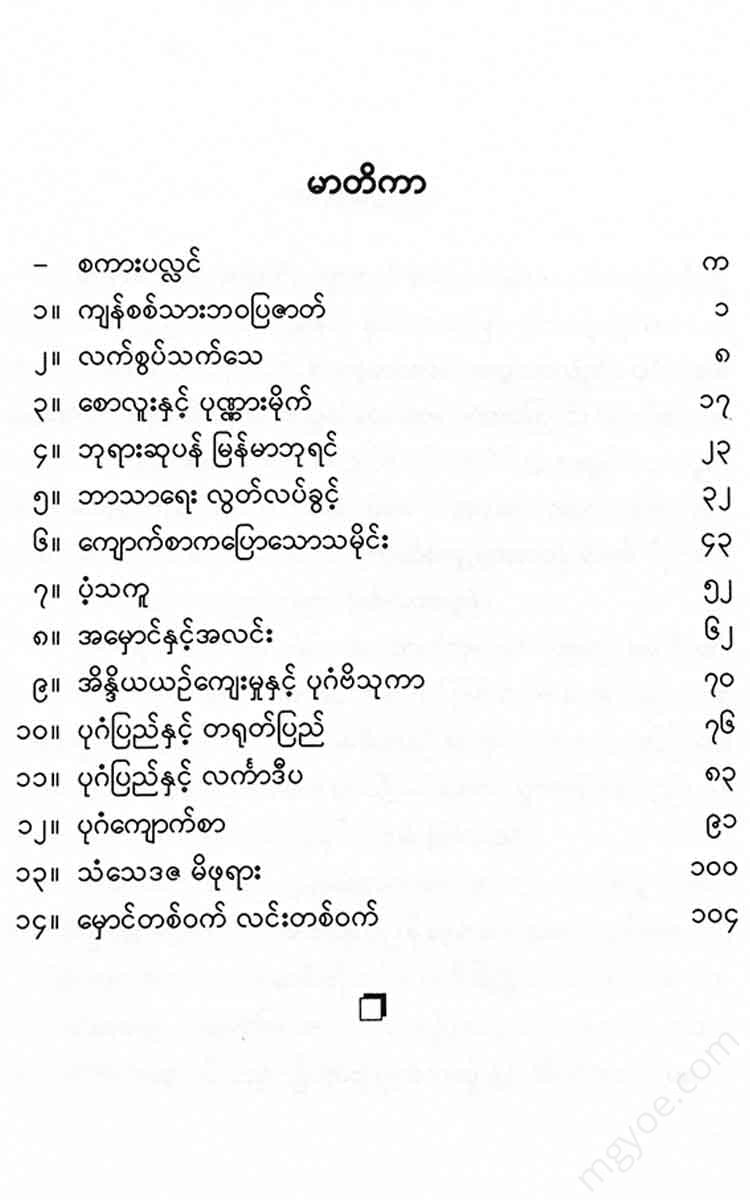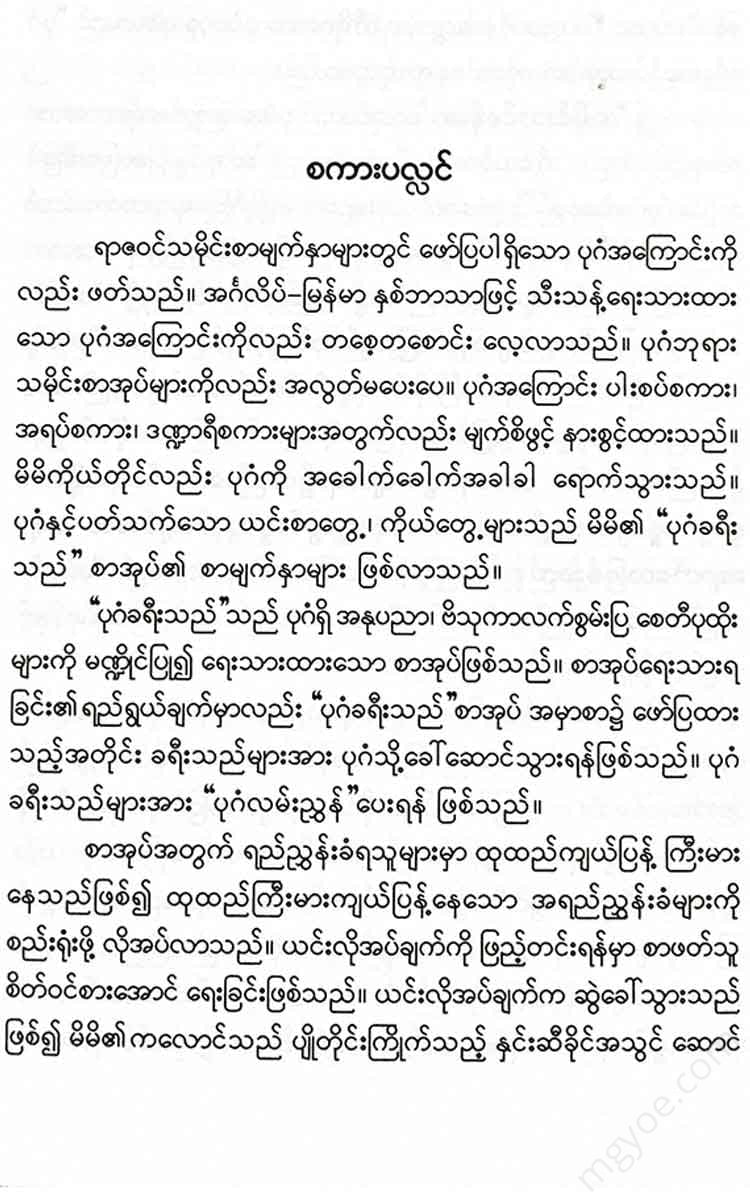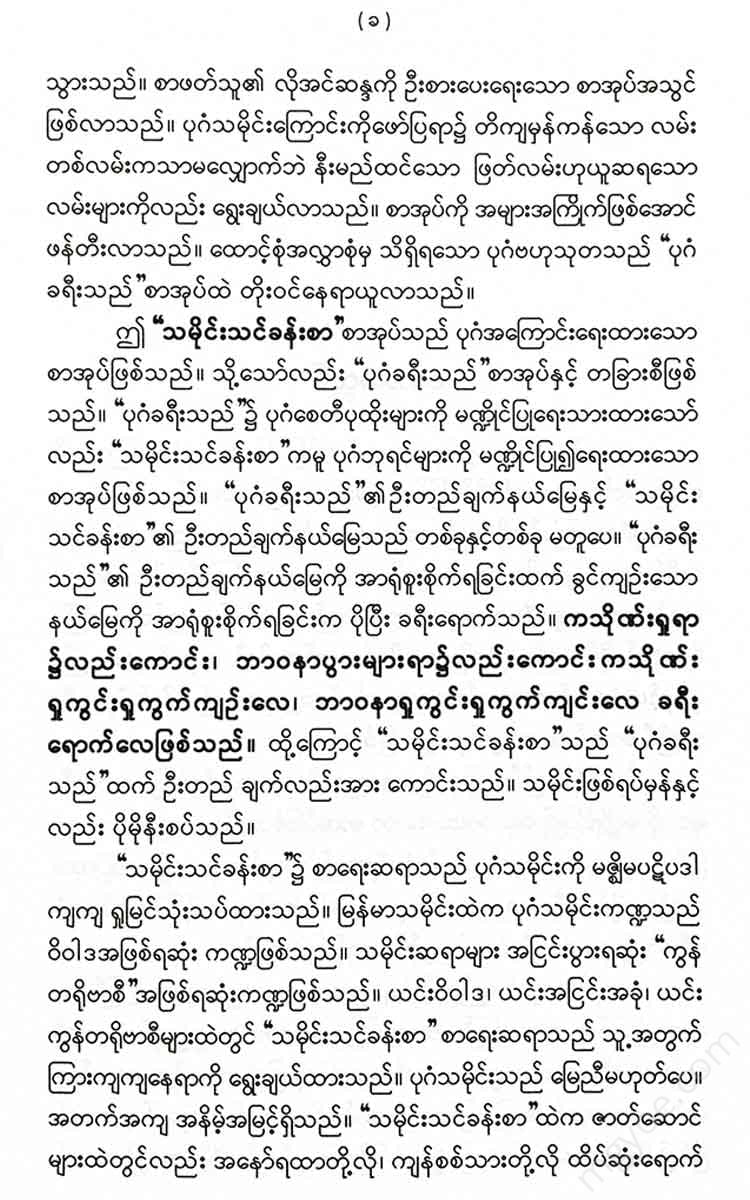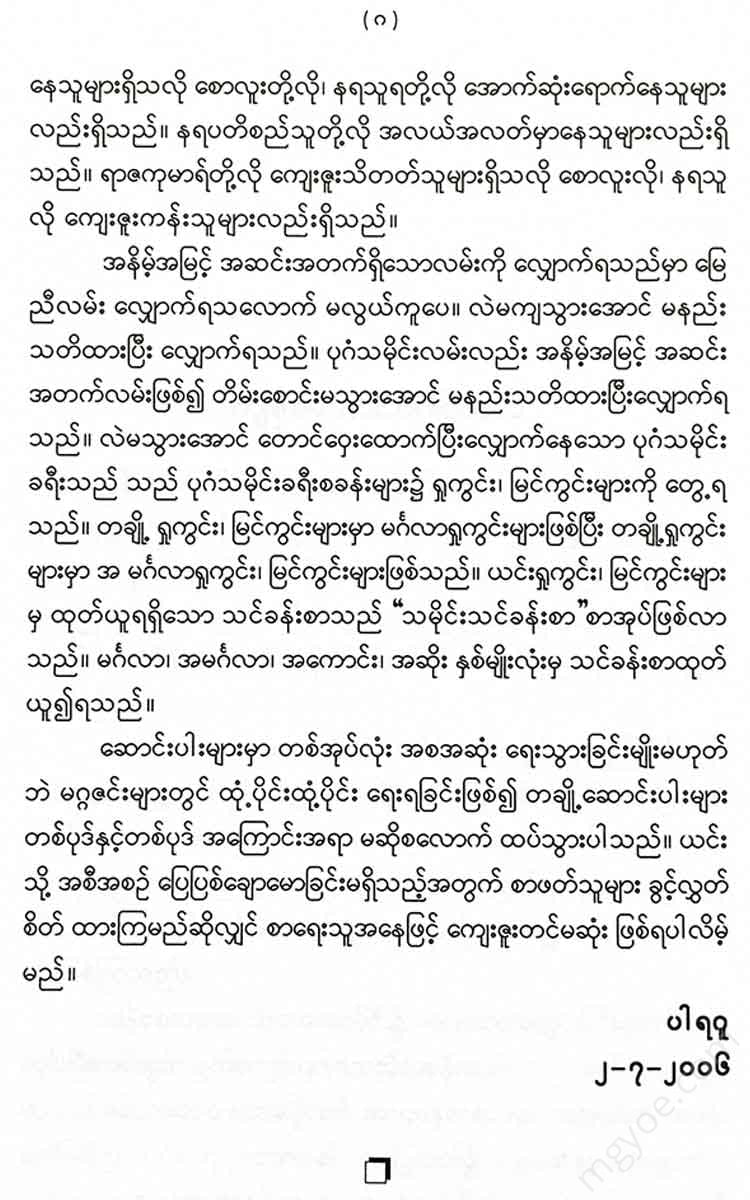စိတ်ကူးချိုချိုစာပေ
Professor - History Lesson
Professor - History Lesson
Couldn't load pickup availability
The rest of the soldier's life drama
Burmese historians describe Kyan Sittha as a fearless and wonderful Burmese king. Kyan Sittha's life is like a play with many twists and turns, one act after another. Even before he ascended the throne of Bagan, Kyan Sittha's life story was full of drama.
The encounters with the princess Utsara, Khin Oo, the chief of Htee Hlaing village, Khin Tan, and the mother of Mathee Tumbul are the heroic scenes in the life drama of the remaining soldier. The battle of Thaton, the war of the Gandhara dynasty, the battle between Utsara Peku and the warrior, and the victory over Ngaramankan are the scenes that depict heroic deeds in the first part of the life drama of the remaining soldier.
In the early days of the soldier's life, there are chapters where he has to pass through the great pits of death one by one. These chapters are the narrative and narrative chapters of the first part of the soldier's life. The drama of the soldier's life concludes with a sadhana. The chapters of the Golden Temple and the Ananda Buddha's residence, and the chapter of the son Rajakumara are the final sadhanas of the drama of the soldier.
There was a great abyss of death in the life of the soldier. The soldier jumped over these great abysses one by one. The first abyss of death was faced by the soldier while he was still in his mother's womb, before he reached the womb. King Vesali gave his daughter Pansakalyani to the envoy who had asked King Anawrahta to give her as a daughter. When Pansakalyani arrived at King Anawrahta's house, the envoy told the king that his daughter Pansakalyani was not King Vesali's natural daughter. King Anawrahta believed the envoy's words and became angry, thinking, "Will you give a daughter to a king like me as an adopted daughter?" He left Pansakalyani in the western palace and then sent her to the farthest place.
A similar incident occurred during the time of the Buddha. When King Pasenadi of Kosala wanted to marry a Sakya Sakya princess, he asked the Sakya Sakya princes for her, and the Sakya Mahanama deceived King Pasenadi by presenting Vasabhaktiya, who was born to him by a maidservant, as a Sakya Sakya princess. King Pasenadi and Vasabhaktiya had a son, Vichupa. One day, when his son Vichupa was visiting Kapilavatthu, he greeted him, but when his son returned, he washed the place where his son had sat, saying that it was the place where his son had sat. This caused Vichupa's ears to ring, and when he became king, Vichupa took revenge on the Sakya Sakyas until he had no offspring.
When they reached the highest point, Pansakalyani's pregnancy became severe. When Hurayaphu and Hurayanyo heard that the prince was pregnant in the north, King Anawrahta was worried about his throne and killed the pregnant women in the north. However, when it was learned that the prince had not died and had been born, he killed the infants and when it was learned that the prince had reached the age of a cowherd, he killed the cowherds. However, the remaining soldiers did not die and escaped death one by one.
Pansakalyani had ordained his son as a monk. At the request of Hurayapyu and Hurayanyo, King Anawrahta wanted to examine the monk who would become the king, so he invited the monks and served them alms and offered them water and alms. It was the turn of the monk to become the king.
Then, as he was eating his meal and pouring water from the bowl, he saw the monk Minlaung's mouth slurping and spitting, and the king was shocked. When Huraya Phyu and Huraya Nyo protested, "Minlaung is not the one who will usurp the throne of His Majesty the King, but will become king after His Majesty the King dies," the king ordered the monk to change into human clothes and sit in his lap.
It is said that the name "Kyan Sitthi" comes from the fact that the soldiers who survived the war were called "Kyan Sitthi" (remaining soldiers) because time passed. However, historians do not accept this fact.
In the pages of world history, there are also many notable individuals who, like other soldiers, escaped death.
Herod was an ancient king of Palestine. During his reign, Jesus was born. When Mary, the mother of Jesus, arrived in Bethlehem, Judea, with her husband Joseph of Nazareth, they had no place to stay and stayed in a stable. That very night, Jesus was born, and the baby was laid in a manger.
The Magi, called wise men, arrived in Jerusalem with gifts. The Magi reported to Herod, king of Palestine, that a child had been born to him. Herod was terrified, thinking that the child he had born would usurp his throne. He asked the Magi to return to him and find out if it was true that Christ had been born in Bethlehem. The Magi had found Christ in Bethlehem, so they returned with gifts. However, they did not enter Jerusalem, but quietly returned by another route.
Herod, enraged by the Magi's deception, issued a decree that all the boys in Bethlehem under two years old were to be killed. His father, Joseph, had a dream that he would flee to Egypt and fled Bethlehem with Christ, so Christ escaped death.
Krishna, who is worshipped by Hindus as a god, also walked on the brink of death several times in his youth. Krishna was the son of Vasudeva and Devati. Vasudeva also married Rohini. He also married Devati, the sister of King Kamsa of Mathura. When Vasudeva and Devati were married, a voice came from the sky, saying, "The eighth son of Devati will kill Kamsa." So King Kamsa imprisoned Vasudeva and Devati and killed all their children up to the sixth. When the seventh child became pregnant, a powerful spirit transferred the child from Devati's womb to Rohini, one of Sudeva's wives who was looking after Nanda and Yashoda in the cowherd village of Gautama. The child born to Rohini later became Balarama, who played an important role in Krishna's life. King Kamsa was told that the pregnancy had been aborted.
Devati became pregnant for the eighth time. When news of Devati's eighth pregnancy reached King Kamsa, he placed a tight guard at Vasudeva and Devati's house to kill the child that was born. He did not dare to commit the sin of killing a woman, but waited for the child to be born.
Meanwhile, Krishna was born. While the guards were asleep, Vasudeva secretly took the newborn Krishna to the house of Nanda and Yasoda in Gautama. At that very moment, Yasoda also gave birth to a child. The child she gave birth to was a girl. Vasudeva brought Yasoda's daughter home before Yasoda knew it.
When the guards heard the baby crying and informed King Kamsa, King Kamsa arrived at Vasudeva and Devati's house to destroy the baby. However, when he saw that Devati's eighth child was not a boy but a girl,
After being convinced, Vasudeva and Devadi were also released from prison.
When Krishna grew up, he realized that King Kamsa was the eighth son of Devati and tried to destroy Krishna in various ways. However, he was unsuccessful and King Kamsa died at the hands of Krishna.
Although the remaining soldier was a hero, he faced great dangers one after another on his journey. When the warriors of Utsapa were attacking Utsapa, King Utsapa asked for help, so King Utsapa sent the warriors led by the remaining soldier to Utsapa. After winning the war, King Utsapa gave his daughter Mani Sanda to King Anawrahta. When he returned to the Bagan palace, King Anawrahta accused the remaining soldier of having an affair with Mani Sanda and killed him with the Arindam spear. However, the remaining soldier was destined to become a historical king in the Bagan throne, and the Arindam spear did not hit the remaining soldier, but only the rope that bound him, breaking the rope. The other soldier picked up the Arindam spear and escaped. The Arindam spear cut his bonds and set him free. - The other soldier faced a life-and-death situation when Saw Lu handed him over to his enemy, Ngara Man Kang. The other soldier risked his life to free Saw Lu from Ngara Man Kang's grasp. However, Saw Lu misunderstood the other soldier and handed him over to Ngara Man Kang, and the other soldier escaped from the abyss of death.
The remaining soldier crossed the great cliffs of death one after another in his life's journey. However, these great cliffs of death could not bring him to an end, but rather, they made his qualities shine even brighter. The life of the remaining soldier bears witness to the proverb that "until death comes, life is not lost."
Reference
- History of the True Kingdom.
- Suthodhitta Maharajya
- History of Burma: GH
- Pageant of Burmese History: WS Desai
- Bible
- Myanmar Encyclopedia (Volume-2)
- Piyadashi, a scholar
- Myths of the Hindus and Buddhists; Siddhar Nuvedita and Ananda Comarawamy
- Pauranika Kosa (Hindi)
